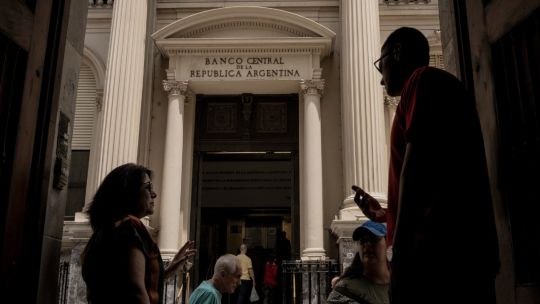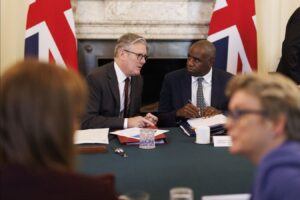
Argentina’s sovereign bonds briefly spiked Wednesday after media outlets reported that US Treasury Secretary Scott Bessent is preparing aid totalling US$40 billion for Javier Milei’s government, double the previous pledge.
Bessent is working on a US$20-billion facility from the private sector that would complement a currency swap line from the government of a similar size, Semafor reported.
Meanwhile, Axios reported that Bessent told reporters the Treasury bought Argentine pesos again in the spot market Wednesday. Banco Santander SA sold dollars on behalf of the US Treasury, according to a person familiar with the matter. Santander declined to comment.
Notes maturing in 2035 jumped two cents before paring most of the advance as doubts returned over the US administration’s long-term commitment to Argentina, trading just below 58 cents on the dollar, according to indicative pricing data compiled by Bloomberg.
The peso wavered, erasing losses after the US intervention in the market was confirmed, then weakening again by nearly 1.5 percent to close at 1,380 per dollar.
The moves show a market that remains hesitant about the implications of the US aid package, particularly after US President Donald Trump appeared to make assistance contingent on a victory for Milei’s party in midterm elections. Although Bessent’s announcement helps dissipate some financial concerns ahead of the October 26 vote, it makes the results more binary, said Santiago Resico, an economist at local brokerage firm one618.
“The lack of clarity about US intentions regarding the aid package diminishes the importance of the size,” he said.
The new facility would be “adjacent” to the US government swap line and has drawn interest from banks and sovereign funds, Bessent said, according to Semafor. The Treasury didn’t immediately reply to a request for comment.
Bessent’s reported comments were a fresh salve for Argentine assets. Milei’s ministers insist he has US support until his term ends in 2027, though Trump has done little to clarify what will happen after the midterms.
“Bessent’s statement is aiming at solving that uncertainty,” said Pedro Siaba Serrate, head of research and strategy of PPI Argentina. “We were not completely ruling out additional hints ahead of the election.”
High rates
Still, the relief after Bessent’s latest comments wasn’t universal. Argentine short-term interest rates soared for a second day, with the overnight collateralised peso repo rate — known as caucion in Argentina — rising to 157 percent from 115 percent the previous session. That increase is coming at a heavy cost to the economy.
“The rise in rates has led to a contraction in commercial lending, a slowdown in consumer credit – particularly credit-card financing – and, indirectly, an increase in delinquency indicators,” Federico Filippini, head of research and strategy at AdCap Financial Group in Buenos Aires, said by email. “All of this is weighing on economic activity.”
High rates are also making it difficult for the Milei administration to extend local debt maturities. The government managed to roll over 45.6 percent of Treasury notes coming due in an auction on Wednesday, Finance Secretary Pablo Quirno wrote in a post on X. The results risk pushing more pesos into the economy as the government moves to honor payments, pressuring the exchange rate.
Still, when the auction clears, that should push pesos into the market, helping to cool down short-term rates, Siaba Serrate said.
Earlier, Milei tried to appease markets on a pre-recorded CNBC interview that aired on Wednesday, saying that US support was ensured at least until Argentina’s 2027 presidential election. He also said that Trump’s aid package was intended to help his nation honor its debt and expressed confidence in his libertarian party’s ability to do well in the upcoming midterm elections.
“Doubts will remain as to whether this loan is contingent on Milei doing well in the midterms,” said Matías Montes, a strategist at EMFI. “Regardless, the US continues to buy pesos, which is super positive for the government.”
related news
by Patrick Gillespie & Nicolle Yapur, Bloomberg





